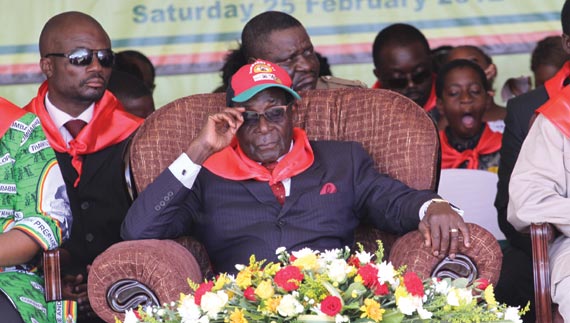
IN a major volte face, President Robert Mugabe’s administration has backed down on its controversial indigenisation policy, with an influential minister in the government hinting the equity law is being watered down, a move analysts say is a tacit admission to failure to turn around the comatose economy.
Njabulo Ncube Deputy Editor
Under Mugabe’s controversial indigenisation law, the government has sought to force foreign-owned companies to cede 51% shareholding to local partners, largely Zanu PF supporters.
Critics have been adamant the law introduced in 2007 is investor-unfriendly, saying it discouraged foreign direct investment which Mugabe has failed to attract since his equally controversial re-election in July 31 last year.
The same critics charge that the law has instead helped to enrich Mugabe’s inner circle they accuse of abusing the indigenisation policy to take over ownership of some foreign-owned firms.
But in a surprise announcement in a Sunday public newspaper, Information minister Jonathan Moyo revealed the equity law would be adapted for different sectors.
“We are reviewing and tightening the indigenisation and empowerment policy by being pragmatic without being dogmatic about,” Moyo told the State-owned media.
“Foreign investors will be allowed to recover initial capital investment, an appropriate return on investment and operational costs before the sharing of production outputs or profits.”
- Chamisa under fire over US$120K donation
- Mavhunga puts DeMbare into Chibuku quarterfinals
- Pension funds bet on Cabora Bassa oilfields
- Councils defy govt fire tender directive
Keep Reading
However, analysts said the climbdown showed Mugabe and Zanu PF were in a fix as far as reversing the economic downturn which party mandarins prefer to refer to as an economic deflation.
“This is really what it is: A major climb-down,” commented Alex Magaisa, a former advisor to MDC-T leader Morgan Tsvangirai during the government of national unity.
“And rightly so because as some of us have said many times before, the existing policy and law is a poison pill for the economy. Perhaps our screams are not in vain.”
Dumisani Nkomo, a Bulawayo-based analyst, said the apparent climbdown was also a reflection of the reality of the country’s economic situation.
“Without foreign direct investment the economy will crumble. Mugabe is probably realising that sloganeering and name-calling won’t bring bread to the table,” said Nkomo.
Officially opening the 55th edition of the Zimbabwe International Trade Fair last month, Mugabe appealed for more foreign direct investment to stimulate Zimbabwe’s underperforming economy, promising to respect property rights for investors.
“There is no expropriation or nationalisation of shares held by non-indigenous persons in companies as some of our detractors would want the world to believe,” Mugabe said.
“In fact, there is no imposition of indigenous partners on foreign investors; instead investors are free to identify partners of their choice. With this clarification, let me take this opportunity to invite potential investors to come and do business in Zimbabwe in which there is huge potential for joint venture partnerships between investors, manufacturers, industrialists and the public sector.”
Bekithemba Mpofu, a Zimbabwean academic based in the United Kingdom, said while indigenisation policies should always be encouraged as part of an empowerment tool and ensuring people have a say in their economy, such policies should be well thought through and implemented over a period of time to allow locals to gain capital and skills to make it work.
“The Zanu PF-sponsored indigenisation was neither sincere nor practical and was driven primarily by political expediency. So, what we are experiencing now are the effects of a policy that was rushed, whose timing was off-kilter and not well reasoned,” he said.
“Zimbabwe is a net importer in a multi-currency regime and foreign investment is, therefore, important to ensure economic stability, arrest balance of payment deficit and liquidity challenges.
“The current indigenisation policy discourages foreign investment and financial deals that boost industry’s quest for performing at full capacity and employment. So yes, the climbdown is induced by the current economic meltdown,” said Mpofu.
The opposition MDC-T spokesperson Douglas Mwonzora said chickens were coming home to roost.
“Zanu PF can rig the elections, but not the economy. The economy cannot be nikuved,” he said, in reference to Nikuv International Limited, an Israel-based firm the MDC-T claimed rigged the July 31 polls in favour of Mugabe and Zanu PF.










